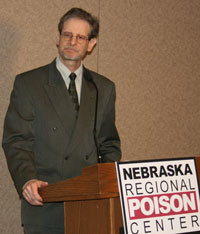 |
Steve Seifert, M.D., medical director at the Nebraska Regional Poison Center, at a news conference Monday commemorating the poison center’s 50th anniversary. Dr. Siefert says poison centers are one of the best health care investments a community can make. |
“The Nebraska Regional Poison Center provides an essential community service. We have saved thousands of lives over the years by providing immediate treatment advice regarding poisonings to both the public and health care professionals,” said Kathy Jacobitz, managing director. “We are proud to celebrate our 50th anniversary and we look forward to the future.”
One person The Nebraska Regional Poison Center saved was 16-year-old Tedd Merrill. When he was a toddler, Merrill swallowed 33 iron pills. At the time, no documented cases existed of anyone surviving such a dose. Poison center personnel helped Merrill get the help he needed, including connecting him with a poison expert in Canada, who helped Merrill survive.
“Well, I pretty much owe … poison control my life,” Merrill said Monday at a news conference commemorating the poison center’s anniversary. Also at the news conference were U.S. Rep. Lee Terry and Omaha Mayor Mike Fahey.
Jacobitz said 40 children died of iron poisoning the same year Merrill swallowed the pills.
Back in the 1950s, poisonings were treated with the syrup ipecac, mercury thermometers were used to check for a fever, the drug thalidomide was being introduced to pregnant mothers, aspirin came in large bottles without safety caps and thousands of children died each year from accidental poisonings.
Pediatricians and other health care professionals realized that they needed 24-hour access to immediate treatment information on all of those toxins.
Poison centers sprang up around the country in large numbers but have now developed into regional emergency telephone and education centers staffed by registered nurses, pharmacists and physicians specializing in toxicology.
A half-century later, the Nebraska Regional Poison Center has grown from taking a few calls a day to being a nationally certified 24-hour center that receives approximately 38,000 incoming phone calls per year with an additional 33,000 follow-up calls made by poison control experts. Calls originate from both health care professionals and the public throughout Nebraska, Wyoming, American Samoa and the Federated States of Micronesia.
“The Nebraska Regional Poison Center has a staff of 15 registered nurses and three physicians. They are a well-trained, nationally-certified, highly-dedicated group of professionals with a wealth of experience in managing poisonings,” Jacobitz said.
The center has grown and prospered under the sponsorship of The Nebraska Medical Center, Creighton University Medical Center and UNMC. This support has enabled the Nebraska Regional Poison Center to continue its mission of providing timely, quality care for poisoned patients throughout the region.
“The traditional mantra for poison centers has been that we save lives and we save money,” said Steve Seifert, M.D., medical director of the poison center and professor of medical toxicology in the department of emergency medicine at UNMC. “We are — in fact — the second best health care investment for your dollar right behind child immunizations.”